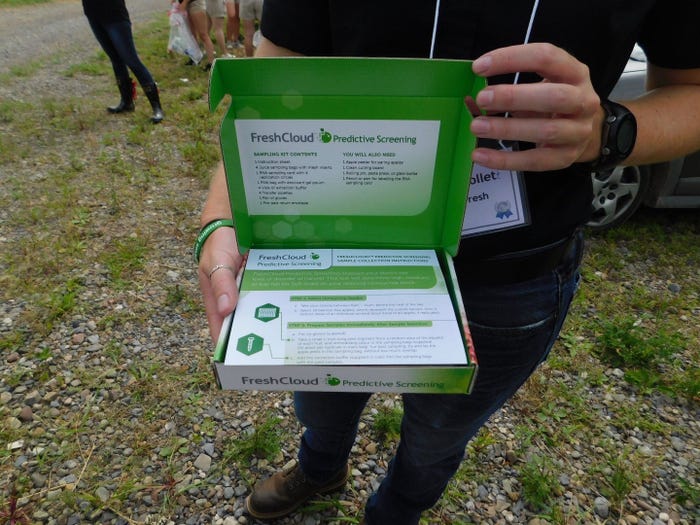Using Genomics Science to Reduce Food Waste
How one company is utilizing predictive screening to evaluate the health of crops and minimize the amount of produce wasted from farm to consumer.
A Philadelphia-based company that provides food preservation and waste reduction solutions for fresh produce has introduced a way to predict the health of crops based on their genes.
AgroFresh Solutions Inc. recently launched the FreshCloud Predictive Screening solution that uses the study of gene expressions to predict fruits' susceptibility to particular disorders in specific crop groups. By analyzing the gene expression of apples at harvest, predictive screening predicts the risk of disorder development in certain varieties.
“The greatest value that FreshCloud Predictive Screening provides to growers is the increased confidence and peace of mind that come from a better understanding of the likelihood of disorder development,” said Nigel Gapper, Ph.D., genomics research and development manager at AgroFresh, in a statement. “Growers understand the intricacies and uncertainties of their business better than anyone. With predictive data on the health of their apples, they are empowered to make smarter decisions about their treatment and storage solutions.”
Combining sensor technology, internet connectivity, data analytics and genomics, FreshCloud also determines whether a particular harvest is low, moderate or high risk for the development of a specific disorder.
“Armed with this knowledge, growers and packers can implement strategic attention to high-risk fruits and can have increased confidence that low-risk fruit will be high quality,” says Brittany Buchanan, FreshCloud global business lead for AgroFresh.
For growers and packers, increased knowledge about their harvests brings enhanced decision-making abilities. For example, when growers know that a particular group of apples is at risk for soft scald, they can help alleviate the disorder by altering the temperatures at which they initially store fruit. Additionally, they can reconsider how and when they sell that specific lot of fruit, according to Buchanan.
“Without this increased visibility on the health of their apples, growers may lose more apples to disorders that make consumers unlikely to purchase and enjoy,” she says.
Growers and packers have an understanding of the produce they grow and how to deliver high-quality fruits and vegetables to their customers, but in the past, they have operated with limited visibility from farm to retailer.
“With increased data into the condition of the fruits and vegetables from the time of harvest through storage and transit, everyone along the fresh produce supply chain has more opportunity to make smarter, better informed decisions about how produce travels from farms and orchards to our homes,” says Buchanan. “Better data along the supply chain could reduce food waste in many different ways. Growers and packers with better data about the health of fruit in their store rooms might decide to bring fruit to market sooner if data suggests that the shelf life may be shorter than they planned.”

Over the summer, 1,000 FreshCloud Predictive Screening sampling kits were distributed, with results expected soon. The idea was to aid orchard customers in determining the risk of soft scald development and ensure that growers meet demand on their honeycrisp apples, one of the most popular apple varieties in the U.S.
“Honeycrisps are one of the most popular apple varieties, and our aim was to help ensure that growers could meet the large consumer demand,” says Buchanan. “Many AgroFresh customers utilized this new technology on honeycrisp apples during the 2018 honeycrisp harvest.”
Predictive screening is available to all honeycrisp growers in the U.S. Preparing samples to send to the AgroFresh Predictive Screening lab requires 40 apples and about 15 minutes at the time of harvest. The company analyzes the juice from skin samples from the same orchard block to determine a risk index for soft scald. In both the Eastern U.S. and in the Pacific Northwest, all participating customers had access to digital results within a few days of sending their sample to the lab.
“We take seriously our commitment to help our customers grow the highest quality produce and minimize the amount of fruits and vegetables that go to waste,” said AgroFresh CEO Jordi Ferre in a statement. “Predictive Screening, and the entire FreshCloud platform, is rooted in our scientific expertise and our understanding of the needs of growers, packers and retailers. With better data about the risk of disorder development, growers and packers can optimize the way they store their harvests, maximize crop value and reduce food waste.”
FreshCloud Predictive Screening is one of the ways AgroFresh has committed to help farmers, packers and retailers reduce their carbon footprint and minimize the amount of produce wasted from farm to consumer.
“Providing quality data and insight will ultimately deliver more high-quality produce to consumers,” says Buchanan.
About the Author
You May Also Like


